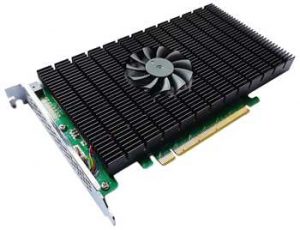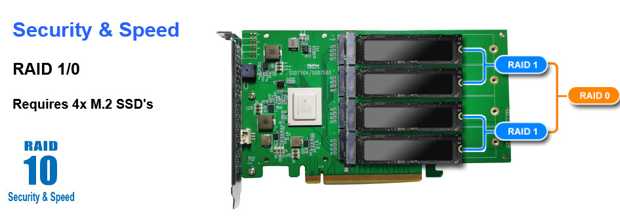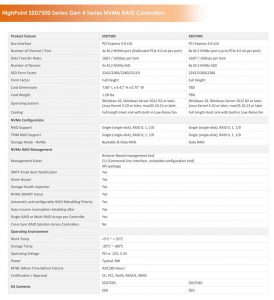HighPoint SSD7505 PCIe 4.0 x16 NVMe RAID Controller
$599, support of RAID-0, -1, -1/0, and combined with NVMe RAID stack and UEFI boot-RAID capability
This is a Press Release edited by StorageNewsletter.com on September 1, 2020 at 2:09 pmHighPoint Technologies, Inc. launches the SSD7505 PCIe 4.0 x16 NVMe RAID controller.
The SSD7505’s dedicated PCIe 4.0 x16 bandwidth combined with latest NVMe RAID stack and UEFI boot-RAID capability, delivers storage performance and versatility in a compact, robust, easy to integrate package.
Independent cutting-edge PCIe Gen 4 x16 NVMe RAID storage performance for AMD platforms
The company’s 7500 Series combine dedicated, PCIe Gen 4 x16 host connectivity with firm’s RAID technology to deliver storage performance. The dedicated PCIe 4.0 x16 host interface enables each NVMe SSD to interface directly with the system CPU to ensure maximum transfer performance and near instant response time.
Independent, stand-alone NVMe RAID solution for Intel and AMD platforms
Unlike most PCIe Gen4 NVMe storage devices in today’s marketplace, which are tied to a specific hardware platform or brand of SSD or motherboard, the SSD7500 series controllers are independent NVMe RAID solutions. These series controllers do not require motherboard platforms with Bifurcation support, or any specialized software released by SSD manufactures; any AMD-based system with a dedicated PCIe 4.0 x16 slot can take advantage of a storage solution. In addition, SSD7500 series controllers are backwards compatible with Intel PCIe 3.0 platforms, enabling customers to take advantage of Gen 4 storage media without migrating to a new computing environment.
Bootable RAID support for Windows and Linux
SSD7500 series NVME RAID controllers can be used to configure bootable RAID or single NVMe SSD configurations for Windows and Linux systems. Optional UEFI downloads and complete installation guides are available for each supported platform.
-
RAID-1/0 (security and speed)– Unique to NVMe RAID solutions, RAID-1/0 (also known as RAID-10) requires a minimum of 4 NVMe SSD’s – it will mirror the data of one stripe array to a second, hidden stripe array for security. RAID-1/0 is capable of delivering read performance on par with RAID-0, and is superior to RAID-5 for NVMe applications. Unlike RAID-5, RAID-1/0 doesn’t necessitate additional parity related write operations, which reduce the TBW life span of NVMe SSD’s.
-
RAID-0 (speed) – Also known as a ‘stripe’ array, this mode delivers maximum performance, and requires a minimum of 2 NVMe SSD’s.
-
RAID-1 (security) – This mode creates a hidden duplicate of the target SSD, and requires 2 NVMe SSD’s to configure. RAID-1 is for bootable volumes.
NVMe RAID support
The 7500 Series NVMe RAID controllers will automatically recognize NVMe SSDS’s as single drives – no configuration necessary. In addition, our NVMe RAID stack enables each controller to support RAID multiple RAID-0, 1 or 10 arrays, or mixed configurations of single disks and RAID storage.
Low-noise hyper-cooling solution
SSD7500 series RAID controllers benefit from redesign of NVMe cooling system. The firm’s Low-Noise Hyper-Cooling solution ensures NVMe SSDs consistently operate within their recommended temperature thresholds, even under sustained heavy I/O, by combining a full length anodized aluminum heat sink with a durable, near-silent fan, and high-conductivity thermal pad. This efficient cooling system rapidly transfers waste heat away from critical NVMe and controller componentry, without introducing unwanted distraction into your work environment.
NVMe RAID management: graphical or text-only interfaces
When it comes to maintaining critical storage configurations, each customer has specific needs and preferences. Both management interfaces share universal layouts across all major OSs, and can be administered locally or remotely via an Internet connection.
The Web RAID Management Interface (WebGUI) is a simple web-based management tool and is for customers who are new to RAID technology.
The CLI (command line interface) is a text-only management interface designed for advanced users and professional administrators.
User guides are available for both interfaces from each controller’s software updates webpage.
Both interfaces were designed to streamline NVMe Storage Management. Customers can track TBW (Terabytes Written) and the temperature of each individual NVMe SSD, ensure the SSD7000 controller is using the fastest available PCIe slot, configure an event log with email notification, and monitor the status of critical RAID configurations in person or remotely via an Internet connection.
Pricing and availability
The SSD7505 is scheduled to begin shipping in early September 2020. The product is currently available by pre-order via the company’s eStore. MSRP: $599.00 for SSD7505.
Click to enlarge
Read also:
HighPoint 8-Channel U.2 and M.2 High Port Count Series RAID Controllers
$649 for SSD7180 – 8x PCIe 3.0 x4 SFF-8643 ports, and SSD7184 – 4x PCIe 3.0 x4 SFF-8643 ad 4x PCIe 3.0 SFF-8644
August 19, 2020 | Press Release
HighPoint SSD7204 Controller With 4-Slot M.2 NVMe SSD for RAID PCIe 3.0/4.0 x8 or x16 Board for Mac, Linux and Windows
$299, delivering over 7,000MB/s of transfer performance, and supporting RAID-0, 1, 1/0 and single disk configurations
June 10, 2020 | Press Release
From HighPoint, SSD7202 Low-Profile Bootable NVMe RAID Controller for Windows and Linux
$299, up to 8TB of storage and 7,000MB/s using two M.2 SSDs
May 26, 2020 | Press Release
















 Subscribe to our free daily newsletter
Subscribe to our free daily newsletter

